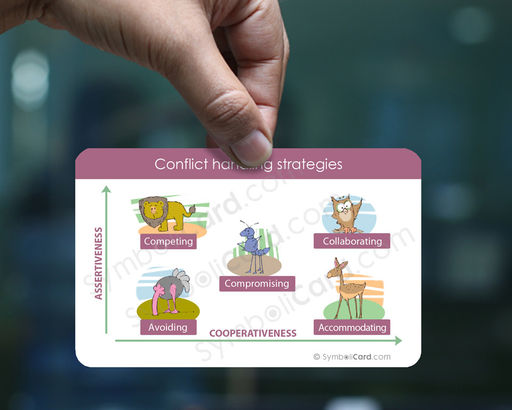|
||||||||||||||
|
||||||||||||||
|
||||||||||||||
All 12 CoachCards supporting the development process can be bought here in one package (altogether 12x8=96 pieces).  Conflict handling strategyThe cards are aimed to develop social comptences through introducing main models of most frequently arising development topics. Such main competences are eg. managerial skills, prioritization and time management, handling conflict, creative thinking, emotional intelligence, impulse control stb.The TKI is designed to measure a person's behavior in conflict situations. "Conflict situations" are those in which the concerns of two people appear to be incompatible. In such situations, we can describe an individual's behavior along two dimensions: (1) assertiveness, the extent to which the person attempts to satisfy his own concerns, and (2) cooperativeness, the extent to which the person attempts to satisfy the other person's concerns. These two basic dimensions of behavior define five different modes for responding to conflict situations: 1. Competing is assertive and uncooperative-an individual pursues his own concerns at the other person's expense. This is a power-oriented mode in which you use whatever power seems appropriate to win your own position-your ability to argue, your rank, or economic sanctions. Competing means "standing up for your rights," defending a position which you believe is correct, or simply trying to win. 2. Accommodating is unassertive and cooperative-the complete opposite of competing. When accommodating, the individual neglects his own concerns to satisfy the concerns of the other person; there is an element of self-sacrifice in this mode. Accommodating might take the form of selfless generosity or charity, obeying another person's order when you would prefer not to, or yielding to another's point of view. 3. Avoiding is unassertive and uncooperative-the person neither pursues his own concerns nor those of the other individual. Thus he does not deal with the conflict. Avoiding might take the form of diplomatically sidestepping an issue, postponing an issue until a better time, or simply withdrawing from a threatening situation. 4. Collaborating is both assertive and cooperative-the complete opposite of avoiding. Collaborating involves an attempt to work with others to find some solution that fully satisfies their concerns. It means digging into an issue to pinpoint the underlying needs and wants of the two individuals. Collaborating between two persons might take the form of exploring a disagreement to learn from each other's insights or trying to find a creative solution to an interpersonal problem. 5. Compromising is moderate in both assertiveness and cooperativeness. The objective is to find some expedient, mutually acceptable solution that partially satisfies both parties. It falls intermediate between competing and accommodating. Compromising gives up more than competing but less than accommodating. Likewise, it addresses an issue more directly than avoiding, but does not explore it in as much depth as collaborating. In some situations, compromising might mean splitting the difference between the two positions, exchanging concessions, or seeking a quick middle-ground solution. Each of us is capable of using all five conflict-handling modes. None of uscan be characterized as having a single style of dealing with conflict. But certain people use some modes better than others and, therefore, tend to rely on those modes more heavily than others-whether because of temperament or practice. Your conflict behavior in the workplace is therefore a result of both your personal predispositions and the requirements of the situation in which you find yourself. The TKI is designed to measure this mix of conflict-handling modes. Specifications:
Six Thinking hats
 Emotional Intelligence
 Urgent-important matrix The matrix of - urgent-important - which is often called also as Eisenhower matrix- defines the priorities of the tasks on the base of importance and urgency. The idea to measure the 2 competeting taskgroups in 1 matrix was coming from the former U.S. President Dwight D. Eisenhower and Dr. Stephen Covey: "I have two kinds of problems: the urgent and the important. The urgent are not important, and the important are never urgent." This "Eisenhower Principle" is said to be how he organized his workload and priorities. No matter how effective we are, sooner or later the number of tasks is surpassing the available time frame. He recognized that great time management means being effective as well as efficient. In other words, we must spend our time on things that are important and not just the ones that are urgent.
Impulse control- Traffic light
 Situational leadership Dr. Kenneth Blanchard management and organizational behaviour professor, sociologist and psychologist, consultant created the model. It is one of the most widely used model during individual and group development. Purchase of Conflict handling strategies coach card: Oldal URL A jelenlegi oldal elsődleges címe: http://coachcard.net/symbolic-coach-card-conflict-handling-strategy-16/ Továbbá az alábbi címen is elérhető: http://coachcard.net/doc16/ |
||||||||||||||
 A szerzői jog a termék szerzőjének vagyoni és személyhez fűződő jogosultságokat biztosít. A vagyoni jogosultságok révén a termék felhasználására csak a szerző engedélyével kerülhet sor. A felhasználásokért a szerzőt ellenszolgáltatás, ún. jogdíj illeti meg. A szerzői jog megsértése esetén a szerző a polgári jogi felelősség szabályai szerint megkövetelheti a kárának megtérítését. A személyhez fűződő és a vagyoni jogokkal kapcsolatos részletes szabályok a szerzői jogról szóló 1999. évi LXXVI. törvény II. és III. fejezetében találhatók. A szerzői jog a termék szerzőjének vagyoni és személyhez fűződő jogosultságokat biztosít. A vagyoni jogosultságok révén a termék felhasználására csak a szerző engedélyével kerülhet sor. A felhasználásokért a szerzőt ellenszolgáltatás, ún. jogdíj illeti meg. A szerzői jog megsértése esetén a szerző a polgári jogi felelősség szabályai szerint megkövetelheti a kárának megtérítését. A személyhez fűződő és a vagyoni jogokkal kapcsolatos részletes szabályok a szerzői jogról szóló 1999. évi LXXVI. törvény II. és III. fejezetében találhatók. |
||||||||||||||
AJÁNLOTT TARTALOM:PARTNERS: |
||||||||||||||
Jump to top | www.coachcard.net home | Sitemap |
||||||||||||||



